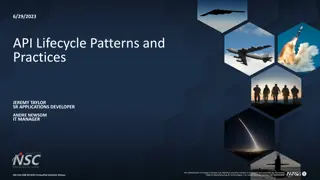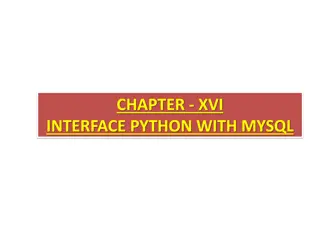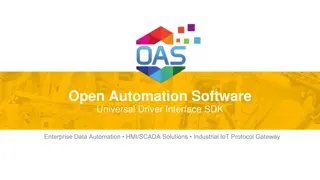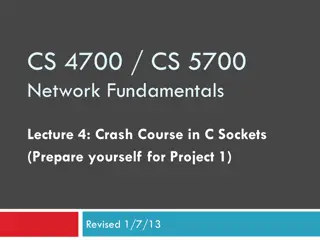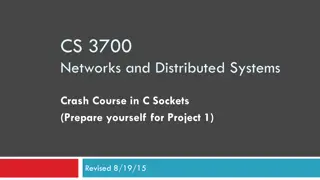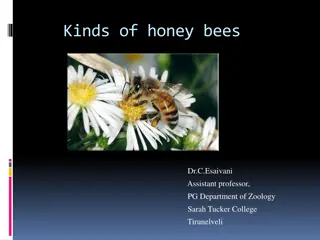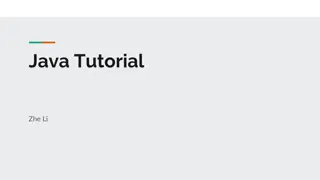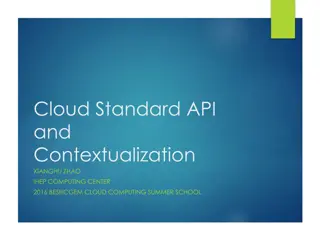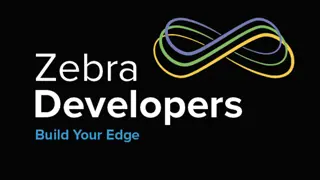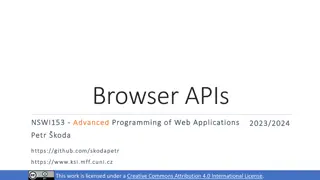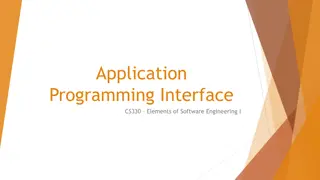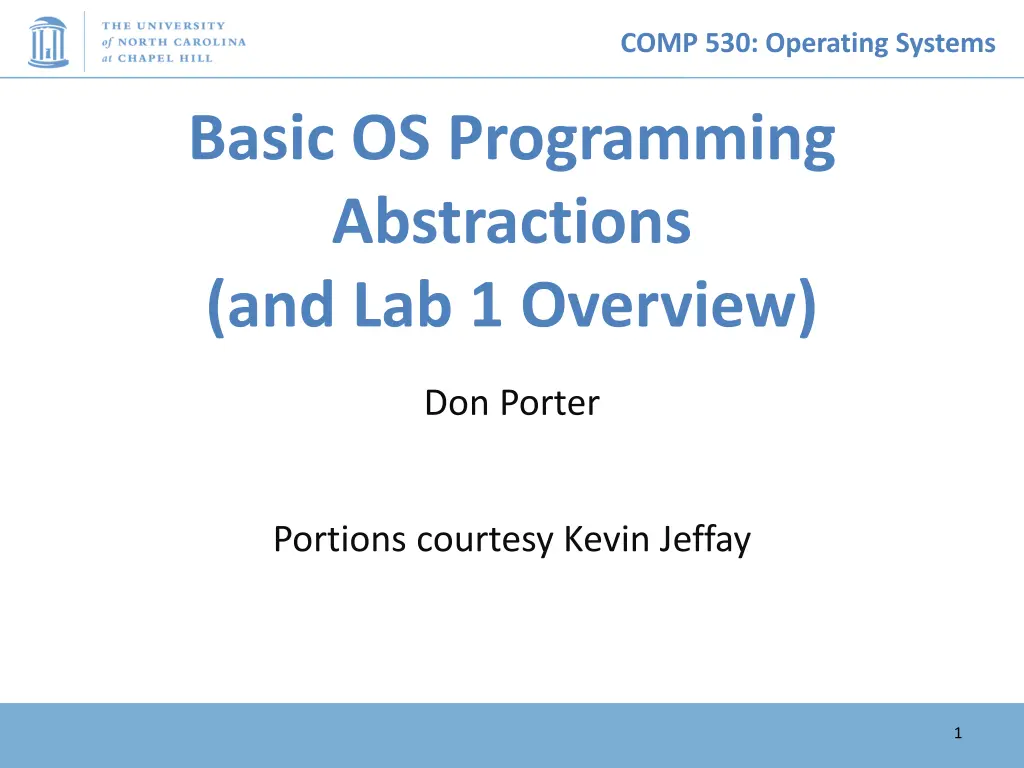
Operating Systems Programming and Abstractions Overview
Explore the fundamentals of operating systems programming and abstractions in COMP 530. Learn about process APIs, shell basics, tasks to perform, process creation with fork/join and exec in Linux. Enhance your understanding through labs and examples.
Download Presentation

Please find below an Image/Link to download the presentation.
The content on the website is provided AS IS for your information and personal use only. It may not be sold, licensed, or shared on other websites without obtaining consent from the author. If you encounter any issues during the download, it is possible that the publisher has removed the file from their server.
You are allowed to download the files provided on this website for personal or commercial use, subject to the condition that they are used lawfully. All files are the property of their respective owners.
The content on the website is provided AS IS for your information and personal use only. It may not be sold, licensed, or shared on other websites without obtaining consent from the author.
E N D
Presentation Transcript
COMP 530: Operating Systems Basic OS Programming Abstractions (and Lab 1 Overview) Don Porter Portions courtesy Kevin Jeffay 1
COMP 530: Operating Systems Recap We ve introduced the idea of a process as a container for a running program This lecture: Introduce key OS APIs for a process Some may be familiar from lab 0 Some will help with lab 2
COMP 530: Operating Systems Lab 1: A (Not So) Simple Shell Lab 1: Parsing for a shell You will extend in lab 2 I m giving you some boilerplate code that does basics My goal: Get some experience using process APIs Most of what you will need discussed in this lecture You will incrementally improve the shell 3
COMP 530: Operating Systems Tasks Turn input into commands; execute those commands Support PATH variables Be able to change directories Print the working directory at the command line Add debugging support Add scripting support Pipe indirection: <, >, and | goheels draw an ASCII art Tar Heel Significant work start early! 4
COMP 530: Operating Systems Outline Fork recap Files and File Handles Inheritance Pipes Sockets Signals Synthesis Example: The Shell
COMP 530: Operating Systems Process Creation: fork/join in Linux The execution context for the child process is a copy of the parent s context at the time of the call main { int childPID; S1; childPID = fork(); fork() if(childPID == 0) <code for child process> else { <code for parent process> wait(); } S2; } childPID = 0 Code Code Data Data childPID = xxx Stack Stack Child Parent
COMP 530: Operating Systems Process Creation: exec in Linux exec allows a process to replace itself with another program (The contents of another binary file) foo: main { S } exec() a.out: main { S0 exec(foo) S1 S2 } Code Data Stack Memory Context
COMP 530: Operating Systems Process Creation: Abstract fork in Linux Common case: fork followed by an exec main { int childPID; S1; childPID = fork(); fork() exec() if(childPID == 0) exec(filename) else { <code for parent process> wait(); } S2; } Code Code main { S } Data Data Stack Stack . /foo Child Parent
COMP 530: Operating Systems 2 Ways to Refer to a File Path, or hierarchical name, of the file Absolute: /home/porter/foo.txt Starts at system root Relative: foo.txt Assumes file is in the program s current working directory Handle to an open file Handle includes a cursor (offset into the file)
COMP 530: Operating Systems Path-based calls Functions that operate on the directory tree Rename, unlink (delete), chmod (change permissions), etc. Open creates a handle to a file int open (char *path, int flags, mode_t mode); Flags include O_RDONLY, O_RDWR, O_WRONLY Permissions are generally checked only at open Opendir variant for a directory
COMP 530: Operating Systems Handle-based calls ssize_t read (int fd, void *buf, size_t count) Fd is the handle Buf is a user-provided buffer to receive count bytes of the file Returns how many bytes read ssize_t write(int fd, void *buf, size_t count) Same idea, other direction int close (int fd) Close an open file int lseek(int fd, size_t offset, int flags) Change the cursor position
COMP 530: Operating Systems Example char buf[9]; int fd = open ( foo.txt , O_RDWR); ssize_t bytes = read(fd, buf, 8); if (bytes != 8) // handle the error lseek(3, 0, SEEK_SET); //set cursor memcpy(buf, Awesome , 7); buf[7] = \0 ; bytes = write(fd, buf, 8); if (bytes != 8) // error close(fd); PC Awesome\0 Awesome\0 buf fd: 3 bytes: 8 User-level stack Kernel Handle 3 Contents\0 Contents Awesome foo.txt
COMP 530: Operating Systems Why handles? Handles in Unix/Linux serve three purposes: 1. Track the offset of last read/write Alternative: Application explicitly passes offset 2. Cache the access check from open() 3. Hold a reference to a file Unix idiom: Once a file is open, you can access the contents as long as there is an open handle --- even if the file is deleted from the directory 13
COMP 530: Operating Systems But what is a handle? A reference to an open file or other OS object For files, this includes a cursor into the file In the application, a handle is just an integer This is an offset into an OS-managed table
COMP 530: Operating Systems Handles Logical View can be shared 50 Handle Table Hello! Foo.txt inode Process A PCB Handle indices are process- specific 20 Process B PCB Disk Handle Table Process C PCB
COMP 530: Operating Systems Handle Recap Every process has a table of pointers to kernel handle objects E.g., a file handle includes the offset into the file and a pointer to the kernel-internal file representation (inode) Applications can t directly read these pointers Kernel memory is protected Instead, make system calls with the indices into this table Index is commonly called a handle
COMP 530: Operating Systems Rearranging the table The OS picks which index to use for a new handle An application explicitly copy an entry to a specific index with dup2(old, new) Be careful if new is already in use
COMP 530: Operating Systems Other useful handle APIs mmap() can map part or all of a file into memory seek() adjust the cursor position of a file Like rewinding a cassette tape
COMP 530: Operating Systems Outline Files and File Handles Inheritance Pipes Sockets Signals Synthesis Example: The Shell
COMP 530: Operating Systems Inheritance By default, a child process gets a reference to every handle the parent has open Very convenient Also a security issue: may accidentally pass something the program shouldn t Between fork() and exec(), the parent has a chance to clean up handles it doesn t want to pass on See also CLOSE_ON_EXEC flag
COMP 530: Operating Systems Standard in, out, error Handles 0, 1, and 2 are special by convention 0: standard input 1: standard output 2: standard error (output) Command-line programs use this convention Parent program (shell) is responsible to use open/close/dup2 to set these handles appropriately between fork() and exec()
COMP 530: Operating Systems Example int pid = fork(); if (pid == 0) { int input = open ( in.txt , O_RDONLY); dup2(input, 0); exec( grep , quack ); } //
COMP 530: Operating Systems Outline Files and File Handles Inheritance Pipes Sockets Signals Synthesis Example: The Shell
COMP 530: Operating Systems Pipes FIFO stream of bytes between two processes Read and write like a file handle But not anywhere in the hierarchical file system And not persistent And no cursor or seek()-ing Actually, 2 handles: a read handle and a write handle Primarily used for parent/child communication Parent creates a pipe, child inherits it
COMP 530: Operating Systems Example int pipe_fd[2]; int rv = pipe(pipe_fd); int pid = fork(); if (pid == 0) { close(pipe_fd[1]); dup2(pipe_fd[0], 0); close(pipe_fd[0]); exec( grep , quack ); } else { close (pipe_fd[0]); ... PCB PC W Handle Table PC Parent R Child Goal: Create a pipe; parent writes, child reads
COMP 530: Operating Systems Sockets Similar to pipes, except for network connections Setup and connection management is a bit trickier A topic for another day (or class)
COMP 530: Operating Systems Select What if I want to block until one of several handles has data ready to read? Read will block on one handle, but perhaps miss data on a second Select will block a process until a handle has data available Useful for applications that use pipes, sockets, etc.
COMP 530: Operating Systems Outline Files and File Handles Inheritance Pipes Sockets Signals Synthesis Example: The Shell
COMP 530: Operating Systems Signals Similar concept to an application-level interrupt Unix-specific (more on Windows later) Each signal has a number assigned by convention Just like interrupts Application specifies a handler for each signal OS provides default If a signal is received, control jumps to the handler If process survives, control returns back to application
COMP 530: Operating Systems Signals, cont. Can occur for: Exceptions: divide by zero, null pointer, etc. IPC: Application-defined signals (USR1, USR2) Control process execution (KILL, STOP, CONT) Send a signal using kill(pid, signo) Killing an errant program is common, but you can also send a non-lethal signal using kill() Use signal() or sigaction() to set the handler for a signal
COMP 530: Operating Systems How signals work Although signals appear to be delivered immediately They are actually delivered lazily Whenever the OS happens to be returning to the process from an interrupt, system call, etc. So if I signal another process, the other process may not receive it until it is scheduled again Does this matter?
COMP 530: Operating Systems More details When a process receives a signal, it is added to a pending mask of pending signals Stored in PCB Just before scheduling a process, the kernel checks if there are any pending signals If so, return to the appropriate handler Save the original register state for later When handler is done, call sigreturn() system call Then resume execution
COMP 530: Operating Systems Meta-lesson Laziness rules! Not on homework But in system design Procrastinating on work in the system often reduces overall effort Signals: Why context switch immediately when it will happen soon enough?
COMP 530: Operating Systems Language Exceptions Signals are the underlying mechanism for Exceptions and catch blocks JVM or other runtime system sets signal handlers Signal handler causes execution to jump to the catch block
COMP 530: Operating Systems Windows comparison Exceptions have specific upcalls from the kernel to ntdll IPC is done using Events Shared between processes Handle in table No data, only 2 states: set and clear Several variants: e.g., auto-clear after checking the state
COMP 530: Operating Systems Outline Files and File Handles Inheritance Pipes Sockets Signals Synthesis Example: The Shell
COMP 530: Operating Systems Shell Recap Almost all commands are really binaries /bin/ls Key abstraction: Redirection over pipes > , < , and | implemented by the shell itself
COMP 530: Operating Systems Shell Example Ex: ls | grep foo Shell pseudocde: thsh fork() csh thsh ls while(EOF != read_input) { parse_input(); // Sets up chain of pipes // Forks and exec s ls and grep separately // Wait on output from grep , print to console // print console prompt } exec(ls)
COMP 530: Operating Systems Lab 1 Overview C programming on Linux refresher Parser for your shell (Lab 1) 39
COMP 530: Operating Systems Shells Shell: aka the command prompt At a high level: while (more input) { read a line of input parse the line into a command if valid command: execute it } We will give you this Lab 1 Lab 2 40
COMP 530: Operating Systems Detour: Environment Variables Nearly all shell commands are actually binary files Very few commands actually implemented in the shell A few built-ins that change the shell itself (exit, cd) Example: ls is actually in /bin/ls For fun, play with which, as in which ls So where to look for a given command? Note that we want some flexibility system-to-system Idea: dynamically set a variable that controls which directories to search 41
COMP 530: Operating Systems Environment Variables A set of key-value pairs Passed to main() as a third argument Often ignored by programmers Serves many different purposes For Lab 1, we need to look at PATH By convention, a single, colon-delimited set of prefixes Example: /usr/local/sbin:/usr/local/bin:/usr/s bin:/usr/bin:/sbin:/bin 42
COMP 530: Operating Systems PATH in a shell If my PATH is /usr/local/sbin:/usr/local/bin:/usr/sbin :/usr/bin:/sbin:/bin Then, for a given command (ls), the shell will check, in order, until found: /usr/local/sbin/ls /usr/local/bin/ls /usr/sbin/ls /usr/bin/ls /sbin/ls /bin/ls 43
COMP 530: Operating Systems Lab 1, Exercise 1 Your first job will be to write parsing code that takes in a colon-delimited set of prefixes, and to create a table of prefixes to try in future commands See path_table in jobs.c We wrote a test harness test_env.c $ PATH=/foo:/bar ./test_env ===== Begin Path Table ===== Prefix 0: [/foo] Prefix 1: [/bar] ===== End Path Table ===== 44
COMP 530: Operating Systems Ex 2: Parsing commands A typical shell command includes a main binary (e.g., ls ) and 0+ whitespace-separated arguments (e.g., -l ) and possibly extra whitespace You will get this as a single character array Your job is to break this up into individual tokens l s \0 l s - l \0 \0 - l \0 Input \0 commands 45
COMP 530: Operating Systems Pipelines A shell can compose multiple commands using pipelines Key idea: standard output of one command becomes standard input of next Example: ls | wc -l List a directory (ls) send listing output to a wordcount utility (wc) to count how many entries in directory The vertical bar (|) is a special character May not appear in any other valid commands Does not need whitespace: ls|wc l is valid 46
COMP 530: Operating Systems parse.c:parse_line() The workhorse for lab 1 (and 2) Takes in a line of input, outputs a 2-D array First dimension: one entry per pipeline stage Simple commands just have one entry Second dimension: one entry per command token 47
COMP 530: Operating Systems How to parse a pipeline? l s | w c - l \0 Input l s \0 \0 commands (parsed) w c \0 \0 - l \0 \0 48
COMP 530: Operating Systems Other special cases Comments anything past a # character File redirection - sets standard input/output to a file Example: ls > mydir.txt Saves the output of ls into a file Example: wc l < mydir.txt Sends the contents of mydir.txt into wc as standard input Built-in commands (see builtin.c) For now, you just need to recognize them and call the appropriate handler function 49
COMP 530: Operating Systems Working on Homework Assignments Use the same learncli211 container as lab 0


